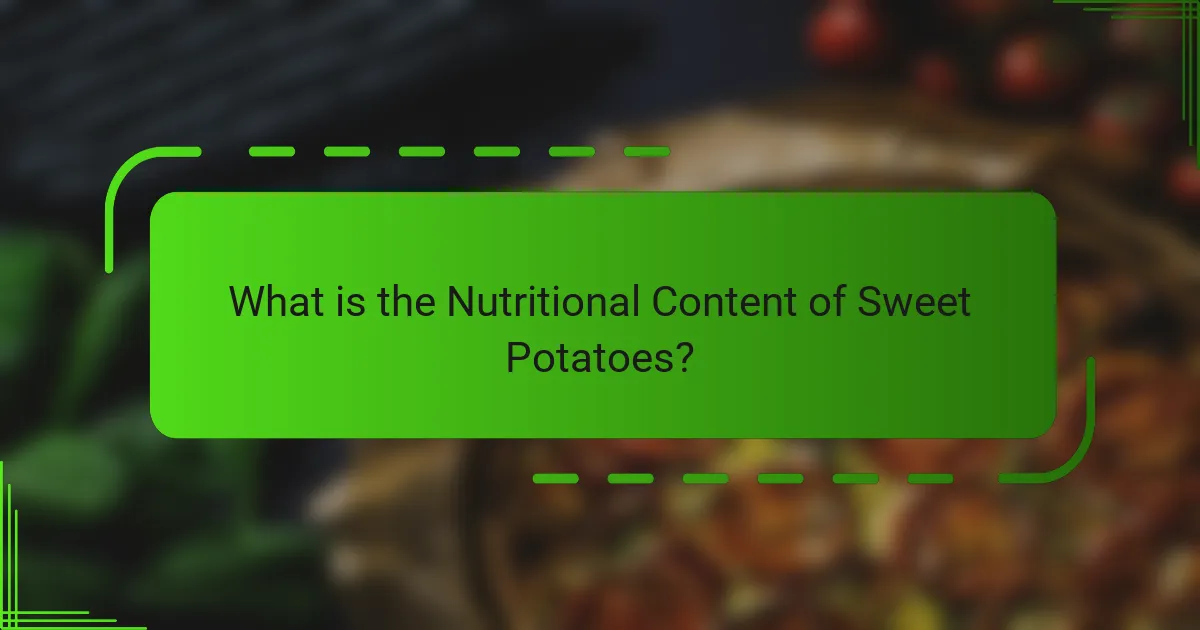Sweet potatoes are highly nutritious root vegetables that offer a range of health benefits. They are rich in essential vitamins, including A, C, and B6, which support immune function and skin health. Additionally, sweet potatoes are high in dietary fiber, promoting digestive health, and have a low glycemic index that aids in blood sugar control. The presence of antioxidants helps combat oxidative stress, while potassium supports heart health and may reduce inflammation. Various cooking techniques, such as baking, boiling, steaming, and roasting, enhance their flavor and maintain their nutritional value, making sweet potatoes a versatile choice in many diets.

What are the Benefits of Sweet Potatoes?
Sweet potatoes offer numerous health benefits. They are rich in vitamins A, C, and B6. These nutrients support immune function and skin health. Sweet potatoes are high in dietary fiber, promoting digestive health. They have a low glycemic index, which aids in blood sugar control. Antioxidants in sweet potatoes combat oxidative stress. Additionally, they contain potassium, which supports heart health. Studies show that consuming sweet potatoes may reduce inflammation. Their versatility in cooking makes them a popular choice in various diets.
How do Sweet Potatoes contribute to overall health?
Sweet potatoes contribute to overall health through their rich nutritional profile. They are high in vitamins A, C, and B6, which support immune function and skin health. Sweet potatoes contain dietary fiber, aiding digestion and promoting a healthy gut. Their low glycemic index helps regulate blood sugar levels, making them suitable for diabetics. Additionally, they are packed with antioxidants like beta-carotene, which protect against oxidative stress. Studies show that regular consumption of sweet potatoes can reduce the risk of chronic diseases, including heart disease and certain cancers. Their potassium content supports cardiovascular health by helping to regulate blood pressure. Overall, sweet potatoes are a nutrient-dense food that enhances health when included in a balanced diet.
What nutrients are found in Sweet Potatoes?
Sweet potatoes contain several key nutrients. They are high in dietary fiber, promoting digestive health. Sweet potatoes are rich in beta-carotene, which converts to vitamin A in the body. They also provide significant amounts of vitamin C, supporting the immune system. Additionally, sweet potatoes contain potassium, which helps regulate blood pressure. Other nutrients include vitamin B6, manganese, and antioxidants. These nutrients contribute to overall health and well-being.
How do these nutrients benefit the body?
Sweet potatoes provide essential nutrients that benefit the body significantly. They are rich in vitamins A and C, which support immune function and skin health. The high fiber content aids digestion and promotes gut health. Sweet potatoes also contain potassium, which helps regulate blood pressure. Additionally, they are packed with antioxidants that combat oxidative stress. These nutrients contribute to overall health and may reduce the risk of chronic diseases. For example, vitamin A is crucial for vision and cellular function, while fiber can lower cholesterol levels.
Why are Sweet Potatoes considered a superfood?
Sweet potatoes are considered a superfood due to their high nutritional value and health benefits. They are rich in vitamins A, C, and B6, which support immune function and skin health. Sweet potatoes also contain dietary fiber, promoting digestive health. Their low glycemic index helps regulate blood sugar levels. Additionally, they are packed with antioxidants, such as beta-carotene, which can reduce the risk of chronic diseases. Studies show that consuming sweet potatoes can improve overall health and well-being. Their nutrient density and versatility in cooking further enhance their superfood status.
What unique compounds do Sweet Potatoes contain?
Sweet potatoes contain unique compounds such as beta-carotene, anthocyanins, and sweet potato protein. Beta-carotene is a powerful antioxidant that converts to vitamin A in the body. This compound contributes to eye health and immune function. Anthocyanins are pigments that provide the purple color in some sweet potatoes. They have anti-inflammatory and antioxidant properties. Sweet potato protein is a unique source of amino acids, supporting muscle health and repair. These compounds collectively enhance the nutritional profile of sweet potatoes, making them a beneficial food choice.
How do these compounds affect disease prevention?
Sweet potatoes contain compounds that significantly aid in disease prevention. These compounds include antioxidants, vitamins, and dietary fiber. Antioxidants in sweet potatoes, such as beta-carotene, help neutralize free radicals. This action reduces oxidative stress, which is linked to chronic diseases like cancer and heart disease. Vitamins, particularly vitamin A, support immune function, enhancing the body’s ability to fight infections. Dietary fiber promotes digestive health and lowers the risk of developing type 2 diabetes. Studies show that a diet rich in fiber can reduce the incidence of colorectal cancer. Therefore, the compounds in sweet potatoes contribute to overall health and disease prevention.

What is the Nutritional Content of Sweet Potatoes?
Sweet potatoes are highly nutritious root vegetables. They are rich in vitamins, minerals, and antioxidants. A medium sweet potato (about 130 grams) provides approximately 112 calories. It contains 26 grams of carbohydrates, 4 grams of fiber, and 2 grams of protein. Sweet potatoes are an excellent source of vitamin A, providing over 400% of the daily value in one serving. They also contain vitamin C, vitamin B6, potassium, and manganese. The high fiber content aids digestion and supports gut health. Antioxidants in sweet potatoes help combat oxidative stress. These nutritional components contribute to overall health and well-being.
What are the key vitamins and minerals in Sweet Potatoes?
Sweet potatoes are rich in key vitamins and minerals. They contain significant amounts of vitamin A, primarily in the form of beta-carotene. A medium sweet potato provides over 400% of the daily recommended intake of vitamin A. They are also a good source of vitamin C, which supports the immune system and skin health. Additionally, sweet potatoes contain B vitamins, including B6 and folate, which are essential for energy metabolism and cell function.
Minerals found in sweet potatoes include potassium, which helps regulate blood pressure and fluid balance. They also provide manganese, important for bone health and metabolism. Sweet potatoes are low in calories and high in dietary fiber, promoting digestive health. This nutritional profile makes sweet potatoes a beneficial addition to a balanced diet.
How do these vitamins and minerals support bodily functions?
Vitamins and minerals in sweet potatoes support bodily functions by promoting overall health. Vitamin A, present in sweet potatoes, is crucial for vision and immune function. It helps maintain healthy skin and mucous membranes. Vitamin C aids in collagen production and enhances iron absorption. This vitamin also supports the immune system and acts as an antioxidant. B vitamins, including B6, play a role in energy metabolism and brain health. They help convert food into energy and support cognitive function. Minerals like potassium regulate fluid balance and muscle contractions. Magnesium supports muscle and nerve function. The fiber in sweet potatoes aids digestion and promotes gut health. These nutrients collectively contribute to optimal bodily functions and overall well-being.
What is the caloric value of Sweet Potatoes?
The caloric value of sweet potatoes is approximately 86 calories per 100 grams. This measurement reflects the raw form of sweet potatoes. The caloric content can vary based on cooking methods. For instance, baking or boiling may slightly alter the caloric value. Sweet potatoes are rich in carbohydrates, providing energy. They also contain dietary fiber, which contributes to their overall nutritional profile.
How do Sweet Potatoes compare to other root vegetables?
Sweet potatoes are nutritionally richer than many other root vegetables. They contain higher levels of beta-carotene, which converts to vitamin A in the body. A medium sweet potato provides about 400% of the daily value for vitamin A. In contrast, carrots, another root vegetable, offer around 184% of the daily value for the same vitamin.
Sweet potatoes also have a lower glycemic index compared to potatoes, making them a better option for blood sugar control. They have approximately 17 grams of carbohydrates per 100 grams, while white potatoes contain about 20 grams. Additionally, sweet potatoes are a good source of dietary fiber, providing about 3 grams per medium-sized tuber.
When comparing antioxidant levels, sweet potatoes outperform many other root vegetables. They contain antioxidants like anthocyanins and phenolic compounds, which contribute to their health benefits. Overall, sweet potatoes offer a unique combination of vitamins, minerals, and antioxidants that set them apart from other root vegetables.
What makes Sweet Potatoes nutritionally superior?
Sweet potatoes are nutritionally superior due to their high levels of vitamins, minerals, and antioxidants. They contain significant amounts of vitamin A, which supports vision and immune function. Additionally, sweet potatoes are rich in dietary fiber, promoting digestive health. They also provide essential minerals like potassium and magnesium, contributing to heart health. The presence of antioxidants, such as beta-carotene, helps combat oxidative stress. Sweet potatoes have a lower glycemic index compared to regular potatoes, making them a better option for blood sugar control. Overall, their unique nutrient profile supports various aspects of health, making them a valuable addition to a balanced diet.
Are there any notable differences in glycemic index?
Yes, there are notable differences in glycemic index among various sweet potato varieties. For instance, orange-fleshed sweet potatoes typically have a glycemic index of around 44. In contrast, purple-fleshed sweet potatoes can have a glycemic index as low as 32. These differences are significant for individuals managing blood sugar levels. The glycemic index can vary due to factors such as cooking methods and the specific variety of sweet potato. Research indicates that boiling sweet potatoes may result in a lower glycemic index compared to baking. This variability highlights the importance of selecting the right type and preparation method for optimal health benefits.

What are the Best Cooking Techniques for Sweet Potatoes?
The best cooking techniques for sweet potatoes include baking, boiling, steaming, and roasting. Baking sweet potatoes at 400°F for 45-60 minutes enhances their natural sweetness. Boiling sweet potatoes for 20-30 minutes makes them tender and easy to mash. Steaming, which takes about 20 minutes, preserves more nutrients compared to boiling. Roasting sweet potatoes at 425°F for 30-40 minutes caramelizes their sugars, adding depth of flavor. Each method showcases the versatility of sweet potatoes while maintaining their nutritional benefits.
How can Sweet Potatoes be prepared for maximum flavor?
Roasting sweet potatoes enhances their natural sweetness and flavor. Preheat the oven to 425°F (220°C). Cut sweet potatoes into uniform pieces for even cooking. Toss them with olive oil, salt, and pepper for added taste. Roasting for about 25-30 minutes caramelizes their sugars, intensifying flavor. Adding spices like cinnamon or paprika can further elevate the dish. Sweet potatoes can also be mashed with butter for a creamy texture. Boiling can dilute their flavor, so roasting is preferred for maximum taste.
What are the benefits of baking versus boiling Sweet Potatoes?
Baking sweet potatoes retains more nutrients compared to boiling them. Baking helps preserve vitamins such as vitamin C and some B vitamins. Boiling can lead to nutrient loss as water-soluble vitamins leach into the cooking water. Additionally, baking enhances the natural sweetness and flavor of sweet potatoes. The Maillard reaction occurs during baking, creating a richer taste. Baking also results in a firmer texture, which some people prefer. Conversely, boiling can make sweet potatoes mushy and less appealing in texture. Therefore, for maximum nutrient retention and flavor, baking is the superior cooking method for sweet potatoes.
How does roasting enhance the nutritional value?
Roasting enhances the nutritional value of sweet potatoes by improving their antioxidant levels. This cooking method increases the availability of carotenoids, which are beneficial for eye health. Studies show that roasting can raise beta-carotene levels significantly. For example, roasted sweet potatoes can contain up to 100% more beta-carotene than raw ones. Additionally, roasting can reduce the glycemic index of sweet potatoes. This makes them a healthier option for blood sugar control. The process also enhances the flavor, making them more enjoyable to consume. Overall, roasting sweet potatoes maximizes their nutritional benefits effectively.
What are some popular recipes using Sweet Potatoes?
Popular recipes using sweet potatoes include sweet potato casserole, sweet potato fries, and mashed sweet potatoes. Sweet potato casserole often features a topping of marshmallows or pecans. Sweet potato fries are typically seasoned and baked or fried until crispy. Mashed sweet potatoes can be made with butter, cream, and spices for flavor. Other recipes include roasted sweet potatoes, which are cubed and drizzled with olive oil and herbs. Sweet potato soup blends cooked sweet potatoes with broth and spices for a creamy dish. Sweet potato pancakes combine grated sweet potato with flour and eggs for a breakfast option. Each recipe highlights the versatility of sweet potatoes in both savory and sweet dishes.
How can Sweet Potatoes be incorporated into breakfast dishes?
Sweet potatoes can be incorporated into breakfast dishes in various ways. They can be mashed and spread on toast for a nutritious alternative to butter. Sweet potatoes can also be diced and sautéed with vegetables for a hearty breakfast hash. Another option is to blend cooked sweet potatoes into smoothies for added creaminess and nutrients. Additionally, sweet potatoes can be baked and served as a side with eggs. They can also be used in pancakes or waffles for a unique twist on classic recipes. These methods provide a delicious way to enjoy sweet potatoes while benefiting from their high nutritional content.
What are some healthy snack options featuring Sweet Potatoes?
Baked sweet potato wedges are a healthy snack option featuring sweet potatoes. They are rich in vitamins A and C. Simply cut sweet potatoes into wedges, season with olive oil, and bake at 400°F for 25-30 minutes.
Sweet potato hummus is another nutritious choice. Blend cooked sweet potatoes with tahini, lemon juice, and garlic for a creamy dip. This snack is high in fiber and protein.
Sweet potato chips also make a great snack. Slice sweet potatoes thinly, toss with olive oil, and bake until crispy. They provide a healthier alternative to regular potato chips.
Stuffed sweet potato skins can be a filling snack. Bake sweet potatoes, scoop out some flesh, and fill with toppings like black beans and cheese. This option is high in protein and fiber.
Lastly, sweet potato energy bites are convenient and nutritious. Combine mashed sweet potatoes with oats, nut butter, and honey. Roll into balls for a quick, healthy snack.
What tips can enhance the cooking experience with Sweet Potatoes?
To enhance the cooking experience with sweet potatoes, choose the right variety. Different types, like orange-fleshed or purple-fleshed, offer unique flavors and textures. Prepare sweet potatoes by washing them thoroughly to remove dirt and pesticides. Cutting them into uniform pieces ensures even cooking. Cooking methods such as roasting or steaming preserve nutrients better than boiling. Seasoning with herbs and spices can elevate the taste significantly. Cooking sweet potatoes with their skins on retains more nutrients. Lastly, allow them to cool slightly after cooking to enhance sweetness and flavor. These tips improve both the culinary experience and the nutritional benefits of sweet potatoes.
The primary entity of the article is sweet potatoes, which are highlighted for their extensive nutritional content and health benefits. The article explores the rich vitamins, minerals, and antioxidants found in sweet potatoes, such as vitamins A, C, and B6, potassium, and dietary fiber, all contributing to immune function, digestive health, and disease prevention. Additionally, it discusses various cooking techniques that enhance flavor and preserve nutrients, including baking, boiling, and roasting. Lastly, the article provides practical tips for incorporating sweet potatoes into meals and snacks, emphasizing their versatility and role as a superfood.